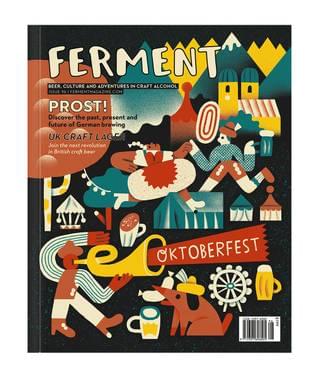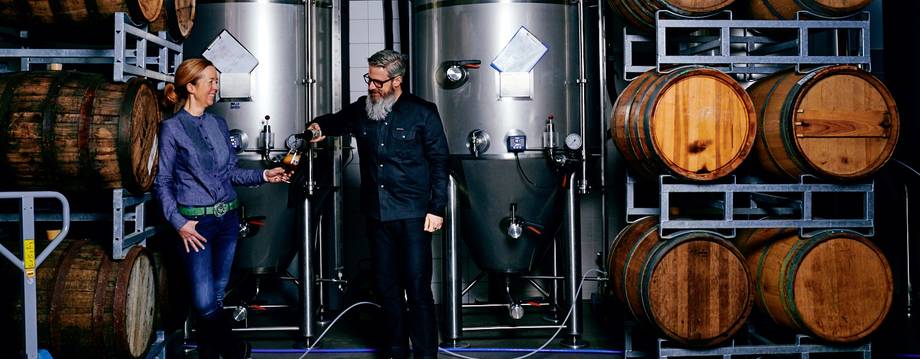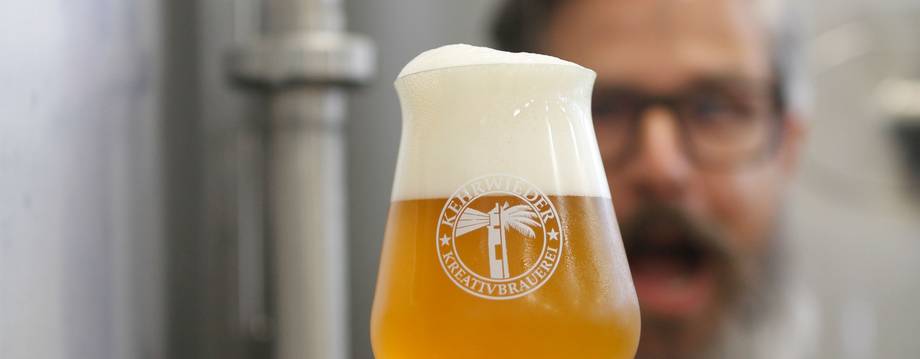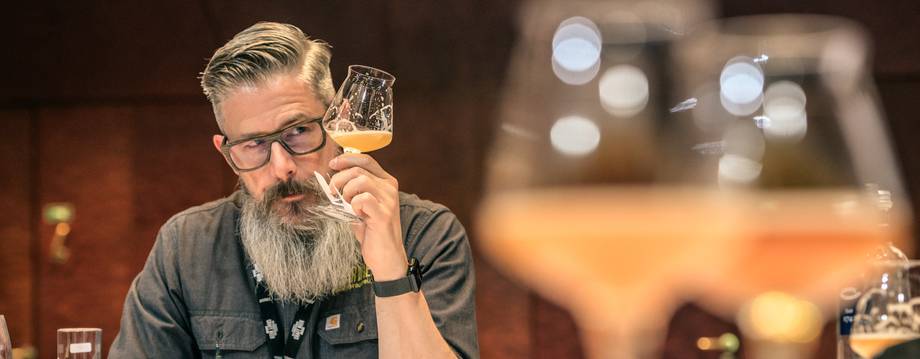All that glitters isn't lager
Between accolades and adversity, Kehrwieder Kreativbrauerei keeps banging the drum for independent, transparent brewing that champions variety
Robyn Gilmour
Photos:
Kehrwieder Kreativbrauerei
Saturday 23 September 2023

This article is from
Oktoberfest
issue 96
Share this article
One could be forgiven for assuming that, like any German brewery, at least some portion of Kehrwieder Kreativbrauerei’s success lies in the fact of it being German. Between the ferocious volume consumed domestically, and the enthusiasm with which international markets seek out a taste of tradition, it’s surely easier to be a brewer in Germany than elsewhere? Yet one only need look at the fully manual, home-made brew kit on which founder Oliver Wesseloh has been brewing since 2012 to guess that, perhaps, opening a new brewery in Germany isn’t always straightforward.
In one way, low taxation aimed at supporting the German brewing industry serves its purpose, but in another, it compounds the price difference between beers brewed with adjuncts and imported hops, and those which use domestic ingredients and abide by the German purity law.
“There’s a much bigger gap to bridge than it would be if the craft beer cost just twice as much, which it would in the UK, or Scandinavia, where tax is higher,” says Olli. But where many would be disheartened, the rollercoaster of Olli’s 30-year brewing career has also cemented a rare curiosity into his perception of adversity.

PHOTO: Martin Kess
Before heading up the North America and Caribbean wing of Ziemann (a world leader in brewhouse manufacturing), Olli had worked as a brewing consultant for drinks companies in Guyana and the Cayman Islands, and the technical manager of Dominica Brewery and Beverage Ltd. Prior to this, he’d studied to become a brewmaster at the Technical University of Berlin, and a beer sommelier at Doemens Academy. All this experience primed Olli for work on iconic projects, like planning Sierra Nevada’s Mill River brewery, assessing the site that would become Stone Berlin, judging the World Beer Cup, and this year, being asked to be Sierra’s Oktoberfest collaboration partner.
It’s fitting that, after working all over the world, Olli should return to Germany with a philosophy forged by travel and start his own brewery named after the idiomatic farewell, ‘kehrwieder’. Historically called out to sailors leaving the port of Hamburg, the term implores a traveller to ‘come back’ safely. Doing just that, Olli founded Kehrweider with the aim of marrying elements of Bavarian brewing with methods, ingredients and flavours from other parts of the world.
“Sierra Nevada has always been a role model for me, so when I came back to Germany to start my own brewery, I wanted to do something similar to what Ken Grossman had done with Sierra’s Pale Ale. The premise of this beer, of course, was to take a traditional European style and brew it with modern raw ingredients, so I thought, ok, let's take a traditional German beer style – a helles lager – and pump it up using speciality floor malts, keeping it moderate in bitterness, and dry hopping it with Saaz and Simcoe.”

The resulting beer, Prototype, was simply brewed to see how people would react, but struck such a chord that it has helped many drinkers transition from industrial lager to ‘craft’ beer.
That word, ‘craft’, is one to which Olli has given a lot of thought. When Kehrwieder first started, it was one of fewer than ten craft breweries in Germany, so Olli reached out to the reached out to the American Brewers Association for advice on how to establish a similar support network at home.
“We were unanimous in wanting to encourage collaboration and friendship across the industry… but beyond that, the craft beer definition that the BA had didn't work at all for Germany,” Olli says. “Back then, the BA defined craft as being small, independent and traditional, but in a US context, ‘small’ meant less than a million barrels a year. ‘Independently owned’ – fine, that one’s self-explanatory – and ‘traditional’ excludes industrial breweries that used corn or rice. If I applied that to Germany, Warsteiner would have been a craft brewery, as back then, it was producing less than 2 million hectolitres a year, it's family-owned, and of course, by law, it has to be traditional.”
We were unanimous in wanting to encourage collaboration and friendship across the industry
Olli recognised then that Germany would need its own definition of ‘craft’. “That’s why we used our own word, a German word, ‘kreativbraurei’, to define ourselves,” says Olli. The German Creative Brewers Association, of which Olli was a founding member, now defines itself as supporting independent, transparent brewing that champions variety. In this context, independence doesn’t have a size limit. To explain why, Olli gives the example of Schneider Weisse’s collaboration with Brooklyn Brewery in 2009, on a dry hopped weissbier; “technically Schneider would have been too big to be considered craft,” says Olli, “but what do I care? They’re creative, they make great beer, they’re family owned. Awesome.”
The GCBA’s definition of transparency takes subtle aim at the Reinheitsgebot, a tradition with integrity that’s now rampantly co-opted by industrial breweries for marketing purposes. The GCBA isn’t so purist as to only allow water, hops, grain and yeast, but it does insist on the use of only natural ingredients, so if you’re using cherries, use fresh cherries or puree, never flavouring, or concentrate.

Oliver, the founder and brewmaster
Finally, the promise to champion variety addresses a problem in many markets, but particularly Germany. “Breweries here have traditionally tried to get into bars, and then take up all taps to keep everyone else out. That's not what beer is about. As a beer sommelier, I want to educate people about beer, then as a brewer, I do my best to make beer that people can be excited about… Education and choice go hand in hand; you never want people to be drinking your beer because it’s the only one available.”
It’s an approach that has seen the Kehrwieder pick up more than 50 international awards over the past 11 years. Many of these are for its three alcohol free beers – an IPA, a coffee stout, and a juicy pale ale – which also account for a staggering 50% of the brewery’s capacity. These are the only Kehrwieder beers currently available in the UK.
In a market both bound by tradition, and dominated by industrial breweries that often treat that tradition quite cynically, Kehrweider’s thoughtful approach to what ‘craft’ means in Germany has provided some possible solutions to the challenges facing all small, creative breweries here. In the face of cheap, homogeneous beer, Kehrweider’s real talent is for identifying a niche, and making one beer tick enough boxes that its reach becomes wide, and welcoming.
Share this article

